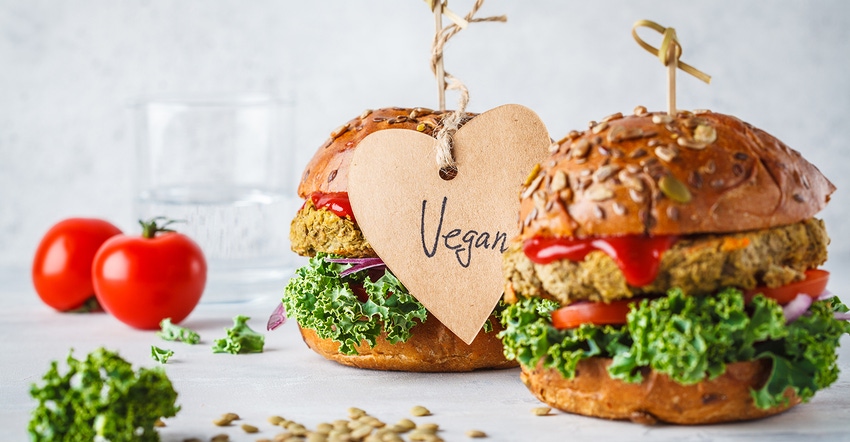The battle over vegetarian product names
New consumer research on the labeling of meat-free products shows food products are often political and not far from controversy.
April 19, 2019

The explosion in the popularity of plant-based diets is well documented. Seven in 10 Americans now believe protein from plant sources to be healthy, while less than four in 10 believe the same of animal protein, according to IFIC Foundation’s 2018 Food and Health Survey. As many as six in 10 said they are cutting back on meat, according to HealthFocus data. In the United Kingdom, one-quarter of a million people are believed to have taken part in this year’s “Veganuary” exercise (in which they are challenged to go vegan for a month), according to the campaign. Trade and consumer-facing media alike have proclaimed 2019 to be “The Year of the Vegan.”
Unsurprisingly, the apparent momentum behind the plant-based movement has prompted considerable debate in the meat and dairy industries about the best way to respond. And the issue that perhaps causes the greatest concern is the use of meat or dairy-related terms, such as “burger” or “milk” to describe products that are vegetarian or vegan. Last year, the U.S. Cattlemen’s Association, arguing consumers are being misled, filed a petition with USDA requesting the agency define the word “meat” so that it cannot be used to label meat-free products.
Over the past couple of years, the meat and dairy lobbies have enjoyed significant legislative wins on this front. In 2017, the European Court of Justice prohibited the use of names such as milk, butter and cheese for nondairy products. Last year, France passed legislation preventing vegetarian products from being labelled in the same way as traditional animal products. And in the United States, companies in Missouri are now banned from “misrepresenting a product as meat” if it doesn’t come from livestock or poultry.
The politician who proposed the French ban is a former cattle farmer, and the Missouri law was supported by the state’s Cattlemen’s Association. It’s to be expected that such groups would want to protect their turf, but where do consumers stand?
Ingredient Communications, with help from expert pollsters Surveygoo, explored attitudes to the naming of meat-free products. Nearly 1,000 people (499 in the U.K. and 484 in the United States) were surveyed, including vegetarians, vegans, pescatarians and meat-eaters.
Across all groups, 25 percent of respondents said manufacturers of vegetarian products should not be permitted to use meat-related names like sausage, burger or steak.
Vegetarians were the least likely to disapprove of meat-related names, with only 18 percent supporting a ban. However, vegans had a different perspective. They were even more likely than meat-eaters to oppose meat-free products using meat-related names, with one in three supporting a ban, and many others being deterred from buying them. Nearly half of the vegetarians surveyed (49 percent) said they were more likely to purchase a meat-free product if it was labelled with a word such as sausage, burger or steak. However, only 19 percent of vegans said the same, with 57 percent saying they were less likely to buy a product if it carried a meat-related name.
One of the questions raised by the research is what brands would call meat analogues if they can’t call them sausages, burgers or steaks. Survey respondents gave the top terminology for “sausages” was “rolls,” the top terminology for “burgers” was “patties,” and the most popular terminology for vegetarian “steaks” was “portions.”
Part of the reason for dislike of “meaty” names on meat-free products seems to be a desire for transparency and honesty―60 percent of those who disapproved believed that meat-related names were misleading. But another explanation is that the labels “vegan,” “vegetarian” and “meat-eater” can describe more than what we eat or don’t eat. They are often distinct tribes with different outlooks. Many vegans are more passionately anti-meat than vegetarians, to the point that they reject products that look or taste like it.
Similarly, the consumption of meat is hugely important to some people’s identities. In the U.K. last year, the media frenzied when high street bakers Greggs launched a vegan sausage roll. TV pundit Piers Morgan was among the infuriated meat-eaters, many of whom said they would boycott the chain.
For food companies marketing to consumers, it seems that there’s a clear lesson about audience segmentation: people looking for meat-free products cannot be viewed as a homogenous group. They comprise distinct tribes, and messages and labels that appeal to some will turn off others.
Broadly, the research showed that brands should never forget that there’s always a political aspect to food―every product will, in some small way, define someone’s identity. And that means food brands are never far from a public relations controversy.
Steve Harman, account director at Ingredient Communications, a global business-to-business communications agency for the ingredients industry. It offers a free communications appraisal for any health or food ingredients company.
About the Author(s)
You May Also Like




.png?width=800&auto=webp&quality=80&disable=upscale)